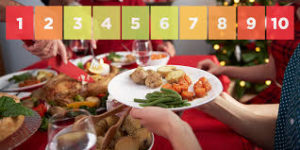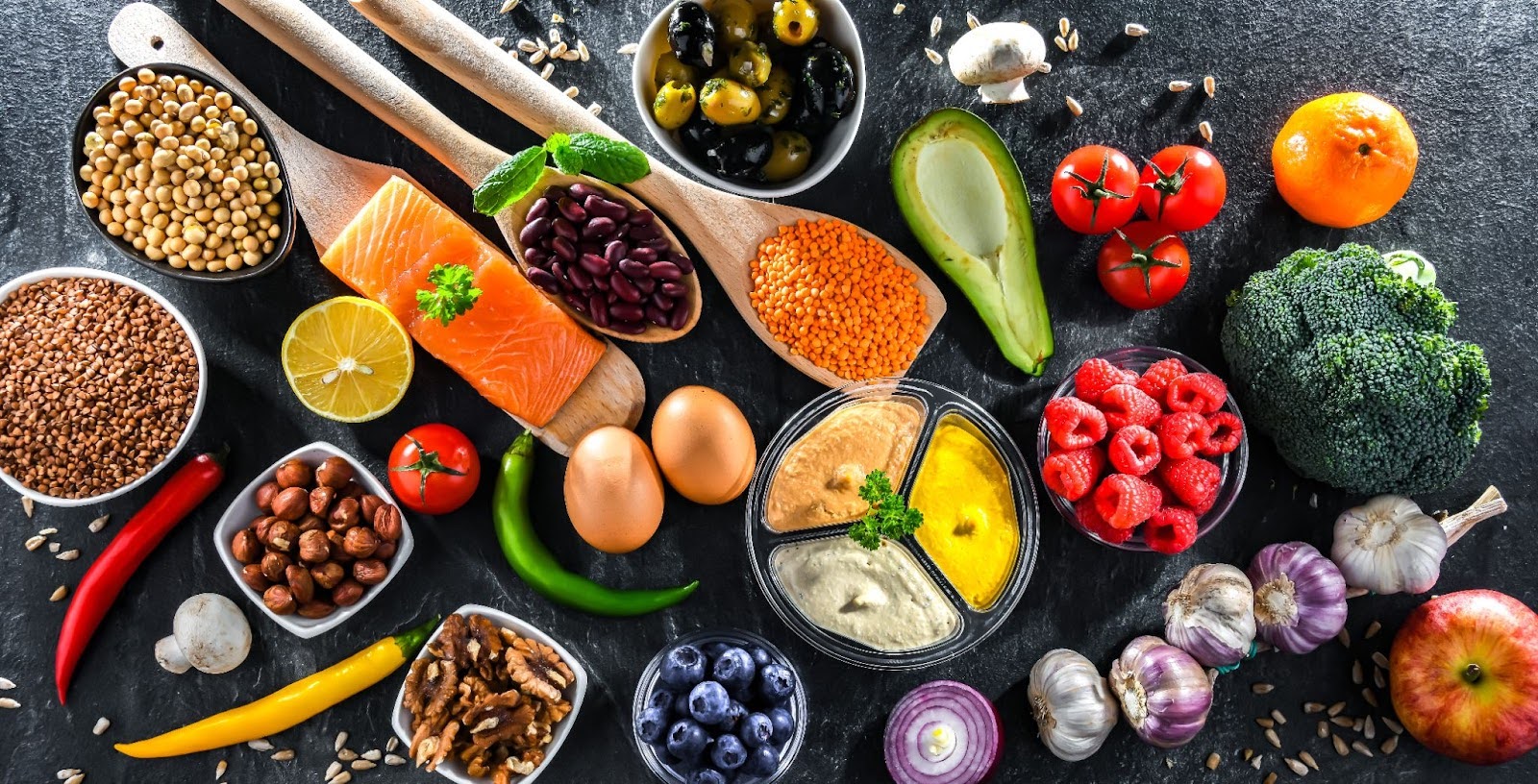
Planning on staying healthy during Christmas and the holiday season? Learn how to develop healthy eating habits and make the best food choices!
Every year around the holidays I like to focus on your relationship with food just a little more than other times of the year. Why? Well, because this seems to be the time when dysfunctional food habits become stronger and more difficult to break. It seems to start when the Halloween candy appears, and wraps up around January 2nd when vows to start a new diet and lose weight emerge. Hello yo-yo! I don’t want this for you. So tell me – would you rather repeat this crazy cycle or try some holiday weight loss tips that’ll really kick your near year into gear? If you choose the latter, keep reading!
 Stop it with the Food Rules:
Stop it with the Food Rules:
Many traditional Christmas holiday health tips are focused on dieting, in part because of the often-overstated statistics about the struggles of holiday weight loss. These sorts of extrinsic food rules, such as “fill up on raw vegetables without dip” or “don’t eat any carbs” can backfire. Just as dieting is a risk factor for binge eating, denying oneself access to favorite foods can lead to overeating or binging, stress and uncomfortable feelings, and other emotions that can lead to comfort eating.
Mindful and intuitive eating, on the other hand, can help you to avoid the “anything and everything goes” vacation mentality as well as the pendulum swing from restriction to excess. It can guide you to choose foods you really truly want and leave the rest, ultimately increasing satisfaction. When you give yourself permission to have and enjoy the pumpkin pie at Thanksgiving, you may be more likely to say “no thank you” to the store-bought sugar cookies in the break room. Do you see the connection there? Staying healthy during the holidays is all about that balance.
Ending the Restriction Cycle
The point of developing healthy eating habits during the holidays is to not deny yourself favorite foods; or eating them while feeling guilty about it. This will help you to not fall in to the restriction-overeating cycle by giving yourself permission to mindfully eat holiday favorites. This takes the power back from the food and reduces the guilt that can be a powerful trigger for overeating. These Christmas holiday health tips should empower you, not demotivate you.
It’s important to not make holiday foods off limits because the allure of forbidden food will only get stronger. I promise it won’t let up. Otherwise, when you finally eat your favorite holiday treat, you’ll have a hard time having just one serving OR you’ll eat more than what you need of another food just to fill the void. If you think you will never eat this food again, it becomes an overeating foodfest. Am I right? It’s so important to shift this perception.
Increasing Satisfaction and Food Pleasure
For people who are new to intuitive and mindful eating, the lure of increased satisfaction can be a point of entry. The best way to enjoy food during the holidays is to neither restrict nor deprive. If you get into that mode, ‘I better eat it now because I won’t have it later,’ you don’t fully enjoy it. Making healthy holiday food choices is a process!
The satisfaction factor can make having a healthy holiday season an actual possibility, and a good time to practice mindful eating skills, because there are so many opportunities for you to enjoy foods you love. Why bother with food you feel so-so about when delicious food is abundant?
Maximizing enjoyment is a better motivator than any “should,” and that maximizing enjoyment could include choosing foods that taste good and feel good to the body. It can be helpful to take a moment to reflect on favorite foods during the holidays and make room for those foods. Alternatively, you can consider which dishes taste the best at each event, and make room for those; although some dishes look better than they taste right? Don’t eat it because it looks good but doesn’t taste good. You’re worth it. Wait for the food you love.
Honoring Hunger
Part of satisfaction stems from being hungry—because it helps food tastes better—but not too hungry. Honoring hunger is a core principle of intuitive eating, and staying nourished throughout the day is essential because if you have primal hunger when you walk into an event, you are not going to fully enjoy the food. That’s for physiological, neurological, and biochemical reasons.
Some people make the mistake of trying to compensate for special holiday treats by skipping lunch or dinner, only to arrive to a party too hungry. When you combine being too hungry with delicious holiday food, it makes it more likely that you will overeat. Being healthy during the holidays doesn’t mean starving yourself.
Also, chaotic, overscheduled days often lead to chaotic eating, and even overeating due to ravenous hunger So while scheduling regular meals and snacks to avoid long gaps without eating may not feel intuitive, it’s important for self-care. It’s more challenging to notice subtle hunger and fullness cues if you’re overscheduled and stressed. Use the hunger and fullness scale to get in touch with your body cues.
Self-Care
Another holiday weight loss tip involves truly taking care of yourself. It’s easier to eat intuitively and mindfully when you’re tending to your mental and emotional state; this is why self-care is so vital. The holiday season is supposed to be joyful, but there are many stressors and emotional triggers that can cause even experienced intuitive eaters to struggle. Food should not be the focus of how you are going to get healthy through the holidays.
Self-care is the way to go. Take part in physical activities that you enjoy (Studio Sweat!) and get plenty of sleep. Sleep deprivation interferes with hunger and fullness cues. I know this well post baby.
While self-care is critical, fitting it in to an already packed day can feel stressful. This is one time when practicality wins over perfectionism. There’s the ideal self-care list, and there’s the minimum requirements to keep your sanity. Name your top 1-3 self-care priorities, which often includes some form of stillness (perhaps journaling, a bath, favorite TV show, or time with nature or in meditation.) When lots of things are competing for attention, prioritizing some stillness can help you stay connected to yourself, and attuned to your body needs.
The 3 S’s—stress, social eating, and schedule overload create the perfect storm that leads to overeating.
Setting Boundaries
Permission to eat and stay attuned to physical and emotional sensations during and after eating, are two intuitive eating principles that go hand in hand, and they also have effects on mindful eating. Instead of trying to follow predetermined diet rules, mindful eating is eating with intention and attention—or purpose and awareness. Set your intention to feel better when you’re done than you did when you started, then eat with attention to your food and your body.
How would you like to enjoy the holiday? Spend some time mentally being there. Imagine yourself enjoying food and walking away not being stuffed. Imagine how it would feel to be stuffed, and do you want to feel that way? Healthy eating habits during the holidays start in your mind.
This sort of rehearsal is also helpful for dealing with food pushers, which can be a holiday trouble zone even for practiced intuitive and mindful eaters. People derive an ego boost from preparing a special dish and may pressure others to eat it. It isn’t your responsibility to make someone happy by overeating, even if it took hours to prepare a specialty holiday dish. You may need to practice politely saying, ‘No thank you.'” Don’t eat for someone else’s sake! “No thank you,” is more challenging for many who have people-pleasing tendencies or less-than-ideal boundaries but you’re worth it. Keep practicing.
Mindful vs Mindless Eating
Mindless eating is the antithesis of mindful eating. For many people, visual food cues, prompting overeating or the choosing of foods that aren’t the most satisfying, triggers mindless eating. You will learn that making healthy holiday food choices can be easier when you have some mindless eating antidotes in your toolbox. Some questions you can ask yourself, “Will you really enjoy eating while talking to other people? When you take your first bite—savor the appearance, aroma, texture, and taste. Does it taste as good as you expected?”
Use the Holidays as a Catalyst for Change
One of the best holiday health tips is to use this time for your benefit. Make solid boundaries, prioritize self-care, and create room for favorite foods. This can help you set the stage for further cultivating mindful and intuitive eating skills after the holidays. When you work on intuitive eating all the time, the holidays and vacations end up being a lot more manageable.
Just to solidify these healthy holiday tips…
10 tips based on the intuitive eating and mindful eating concepts:
- Give yourself permission to eat your favorite foods. This will help you take back the power from the food, reduce guilt, and avoid triggers to overeat.
- Don’t restrict or deprive oneself. This is the best way for you to enjoy food during the holidays.
- Choose foods that taste good to maximize enjoyment.
- Determine the foods you like most and taste the best at each event, and make room for those foods.
- Stay nourished throughout the day to avoid going to parties hungry.
- Schedule regular meals and snacks to prevent long gaps without eating to prevent being overly hungry.
- Engage in physical activities they enjoy and get plenty of sleep. Sleep deprivation interferes with hunger and fullness cues.
- Name your top three self-care priorities, which often involve personal quiet time, such as journaling, taking a bath, watching your favorite show, enjoying nature, or meditating. Prioritizing personal time enables you to stay connected to yourself and attuned to your bodily needs.
- Eat with intention and attention to their food and body. Being attune to physical and emotional sensations during and after eating are two intuitive eating principles that go hand in hand.
- Brainstorm and rehearse responses to friends and family members who continue offering you food to eat when you’re full. You can say, “This is delicious, but I’m full. I’d love to take some leftovers,” or simply, “No thank you,” even if you have to repeat themselves.
Now try something different so you can feel different come January.
Happy, Healthy Holidays fit friends!
Miriam Turner
Studio SWEAT Dietitian
References:
- Introducing mindful eating. The Center for Mindful Eating website. http://www.thecenterformindfuleating.org/IntroMindfulEating
- Today’s Dietitian, Carrie Dennett, MPH, RDN, CD, is the nutrition columnist for The Seattle Times and speaks frequently on nutrition-related topics. She also provides nutrition counseling via the Menu for Change program in Seattle.









Comments - 0